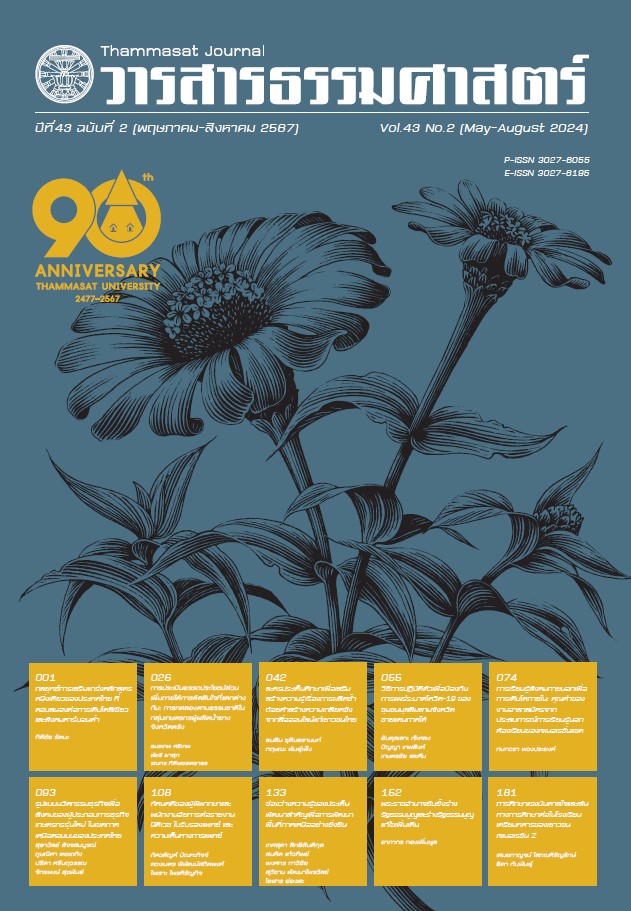The Royal Prerogative to Veto Draft Constitutions and Constitutional Amendments: An Analysis from the Perspective of the Constituent Power Theory and Thai Constitutional Court’s Decisions
Main Article Content
Abstract
The article aims to study the monarch’s royal prerogative to veto the draft constitutions and constitutional amendments. This prerogative was examined through related theories, constitutional provisions, and comparative constitutional history in the context of politics and government in Thailand and abroad, as well as court rulings. The goal was to better understand the use of royal powers in the constitutional process. The study indicates that most Thai constitutions have legislated to recognize such royal prerogative, both explicitly and implicitly. Although the Constitution of the Kingdom of Thailand, Buddhist Era 2560 (2017), does not explicitly legislate the royal power to veto additional constitutional amendments, it also does not provide the legislature with the authority to confirm such amendments for the Prime Minister to proclaim in the Royal Gazette as the Constitution of the Kingdom of Thailand, as if the King had already given his Royal Assent as in previous constitutions. The Constitutional Court, stating in its rulings that no constitution of the Kingdom of Thailand has ever been completed without the consent of the King, who is the Head of State, suggests that the Court tends to view the King as the final authority in deciding whether any political document becomes or does not become the constitution. While some rulings of the Constitutional Court refer to the constitutional founding power as belonging to the people, the aim is to make the amendment of the constitution more difficult, thus reflecting a judgement in the context of maintaining the constitution as the supreme law without denying the status of having the final decision-making authority. This reflects the phenomenon in the current constitution-making process where the King has participated in defining the content of the new constitution draft and has the power to veto amendments passed by referendum, without any constitutional means for the public to confirm the intention to use the original draft in any way.
Article Details
References
คณิน บุญสุวรรณ. (2548). ปทานุกรม ศัพท์รัฐสภาและการเมืองไทย ฉบับสมบูรณ์. กรุงเทพฯ: สุขภาพใจ.
เจษฎา พรไชยา. (2546). พระราชอำนาจของพระมหากษัตริย์ของประเทศไทยกับประเทศอังกฤษ. กรุงเทพฯ: สำนักพิมพ์จุฬาลงกรณ์มหาวิทยาลัย.
ชมพูนุช ตั้งถาวร. (2556). กระบวนการแก้ไขเพิ่มเติมรัฐธรรมนูญและการควบคุมความชอบด้วยรัฐธรรมนูญของการแก้ไขเพิ่มเติมรัฐธรรมนูญในต่างประเทศ. กรุงเทพฯ: สถาบันพระปกเกล้า.
ณัฐพงษ์ สายวงค์. (2560). การควบคุมความชอบด้วยรัฐธรรมนูญของการแก้ไขเพิ่มเติมรัฐธรรมนูญ: ศึกษากรณีศาลสูงสุดของประเทศสหรัฐอเมริกากับศาลรัฐธรรมนูญไทย. [วิทยานิพนธ์ปริญญามหาบัณฑิต]. มหาวิทยาลัยธรรมศาสตร์.
ณภัทร์พร สิงห์ประเสริฐ. (2552). พระราชอำนาจของพระมหากษัตริย์ในการยับยั้งร่างกฎหมาย. [วิทยานิพนธ์ปริญญามหาบัณฑิต]. จุฬาลงกรณ์มหาวิทยาลัย.
ณรงค์เดช สรุโฆษิต. (2564). ข้อพิจารณาบางประการเกี่ยวกับอำนาจสถาปนารัฐธรรมนูญ. ใน ณรงค์เดช สรุโฆษิต (บรรณาธิการ), รัฐ รัฐธรรมนูญ และสิทธิเสรีภาพ ทฤษฎีและปัญหาท้าทายในยุค 2021: รวมบทความทางวิชาการในโอกาสที่ ศาสตราจารย์ ดร.เกรียงไกร เจริญ ธนาวัฒน์ อายุครบ 60 ปี, (74-78). กรุงเทพฯ: เดือนตุลา
ไทยรัฐ. (2556, 8 ธันวาคม). นายกฯ ขอพระบรมราชานุญาต ถอนร่างแก้ไข รธน. Thairath Online. https://www.thairath.co.th/content/388028
นครินทร์ เมฆไตรรัตน์. (2559). ความเห็นในการวินิจฉัยคดีส่วนตน ของ นายนครินทร์ เมฆไตรรัตน์ ตุลาการศาลรัฐธรรมนูญ (คำวินิจฉัยศาลรัฐธรรมนูญที่ 7/2559). http://www.constitutionalcourt.or.th/occ_web/download/article/article_20170718154109.pdf
บวรศักดิ์ อุวรรณโณ และวิษณุ เครืองาม. (2520). พระราชฐานะของพระมหากษัตริย์ตามธรรมนูญการปกครองราชอาณาจักร. วารสารกฎหมายจุฬาลงกรณ์มหาวิิทยาลััย. 3(2), 148-183.
บวรศักดิ์ อุวรรณโณ. (2557). คำอธิบายกฎหมายมหาชน เล่ม 2 การแบ่งแยกกฎหมายมหาชน – เอกชนและพัฒนาการกฎหมายมหาชนในประเทศไทย. กรุงเทพฯ: นิติธรรม.
_____. (2550). คำอธิบายกฎหมายมหาชน เล่ม 2 การแบ่งแยกกฎหมายมหาชน – เอกชนและพัฒนาการกฎหมายมหาชนในประเทศไทย. (พิมพ์ครั้งที่ 5). กรุุงเทพฯ: นิติธรรม.
ปัญญา อุดชาชน. (2559). ความเห็นในการวินิจฉัยคดีส่วนตน ของ นายปัญญา อุดชาชน ตุลาการศาลรัฐธรรมนูญ (คำวินิจฉัยศาลรัฐธรรมนูญที่ 7/2559). http://www.constitutionalcourt.or.th/occ_web/download/article/article_20170718154443.pdf
ปูนเทพ ศิรินุพงศ์. (2557). พระราชอำนาจยับยั้งร่างพระราชบัญญัติ. [วิทยานิพนธ์ปริญญามหาบัณฑิต]. มหาวิทยาลัยธรรมศาสตร์.
ปิยบุตร แสงกนกกุล. (2557). ราชมัล ลงทัณฑ์ บัลลังก์ ปฏิรูป. กรุงเทพฯ: ไชน์ พับลิชชิ่ง เฮ้าส์.
_____. (2559). รัฐธรรมนูญ ประวัติศาสตร์ข้อความคิด อำนาจสถาปนา และการเปลี่ยนผ่าน.กรุงเทพฯ: ฟ้าเดียวกัน.
พระราชบัญญัติยศทหาร (ฉบับที่ 8) พ.ศ. 2556. (2556, 20 พฤศจิกายน). ราชกิจจานุเบกษา เล่ม 130 ตอนที่ 109 ก หน้า 5
ไพโรจน์ ชัยนาม. (2495). คำอธิบายกฎหมายรัฐธรรมนูญเปรียบเทียบ (โดยสังเขป) เล่ม 2 ตอนที่ 1 กฎหมายรัฐธรรมนููญของประเทศไทย. กรุงเทพฯ: สำนักพิมพ์มหาวิทยาลัยธรรมศาสตร์.
มติชนสุดสัปดาห์. (2560, 22 ธันวาคม). ปิยบุตร แสงกนกกุล: ประวัติศาสตร์ภูมิปัญญาปฏิวัตฝรั่งเศส (พระมหากษัตริย์-รัฐธรรมนูญ-ดุลยภาพ). https://www.matichonweekly.com/column/article_71759
มติชนสุุดสัปดาห์. (2561, 4 มกราคม). ปิยบุตร แสงกนกกุล: ประวัติศาสตร์ภููมิปัญญาปฏิวัติฝรั่งเศส (กษัตริย์มีมาก่อนรัฐธรรมนูญ แต่ไม่ได้เป็นผู้สถาปนารัฐธรรมนูญ). https://www.matichonweekly.com/column/article_74012
รัฐธรรมนูญแห่งราชอาณาจักรไทย แก้ไขเพิ่มเติม (ฉบับที่่ 2) พุุทธศัักราช 2554. (2554, 4 มีนาคม). ราชกิจจานุุเบกษา เล่ม 128 ตอนที่ 13 ก หน้า 7
วรเจตน์ ภาคีรัตน์. (2561). ข้อพิจารณาโดยสังเขปเกี่ยวกับการเกิดขึ้นของรัฐธรรมนูญ และรัฐธรรมนููญในบริบทของการเปลี่ยนแปลงการปกครอง 24 มิถุนายน 2475. ใน Ingwer Ebsen, Dirk Ehlers and Henning Glaser (บรรณาธิการ), Democracy, Constitution and Human Rights รวมบทความทางวิชาการภาษาไทย อังกฤษ และเยอรมัน ในวาระ 70 ปี วรวิทย์ กนิษฐะเสน (พิิมพ์์ครั้งที่ 2), (144). กรุงเทพฯ: คณะนิติศาสตร์ มหาวิทยาลัยธรรมศาสตร์.
วรวิทย์ กังศิเทียม. (2559). ความเห็นในการวินิจฉัยคดีส่วนตน ของ นายวรวิทย์ กังศิเทียม ตุุลาการศาลรัฐธรรมนูญ (คำวินิจฉัยศาลรัฐธรรมนูญที่ 7/2559). https://www.constitutionalcourt.or.th/occ_web/ download/article/article_20170718154559.pdf
วิลเลียม ดอยล์. (2564). ปฏิวัติฝรั่งเศส: ความรู้ฉบับพกพา [The French revolution] (ปรีดีหงษ์สต้น, แปล). กรุงเทพฯ: บุ๊คสเคป. (ต้นฉบับพิมพ์ปี ค.ศ. 2019).
วิษณุ วรัญญู. (2565). ข้อพิจารณาบางประการที่เกี่ยวกับอำนาจสถาปนารัฐธรรมนูญ. ใน สินิทธ์ สินิทธานนท์ และคณะ (บรรณาธิการ), หนังสือที่ระลึกเนื่องในโอกาสเกษียณอายุราชการ ศาสตราจารย์พิเศษ ดร.ชาญชัย แสวงศักดิ์ ประธานศาลปกครองสูงสุด, (208-209). กรุงเทพฯ: สำนักงานศาลปกครอง.
สำนักข่าวอิสรา. (2556, 1 ตุลาคม). ยิ่งลักษณ์ยันเดินหน้านำร่างแก้ไขรธน.ที่มา ส.ว. ขึ้นทูลเกล้าฯ.https://www.isranews.org/isranews-news/24125-yiyi.html
สำนักงานเลขาธิการสภาผู้แทนราษฎร. (2475). รายงานการประชุมสภาผู้แทนราษฎร ครั้งที่ 34/2475 วันที่ 24 พฤศจิกายน พ.ศ. 2475. สภาผู้แทนราษฎร.
สิรีธร ราชเดิม. (2561). ความสัมพันธ์ระหว่างกฎหมายระหว่างประเทศและกฎหมายภายใน: ศึกษาทางปฏิบัติของตุลาการไทย. [วิทยานิพนธ์ปริญญามหาบัณฑิต]. มหาวิทยาลัยธรรมศาสตร์.
หยุด แสงอุทัย. (2495). คำอธิบายรัฐธรรมนูญ พุทธศักราช 2475-95. กรุงเทพฯ: ชูสิน.
หยุด แสงอุทัย และวรเจตน์ ภาคีรัตน์. (2551). คำอธิบายรัฐธรรมนูญแห่งราชอาณาจักรไทย พุทธศักราช 2511 และธรรมนูญการปกครองราชอาณาจักร พุทธศักราช 2515 ว่าด้วยพระมหากษัตริย์. กรุงเทพฯ: วิญญูชน.
ไอลอว์. (2560, 6 เมษายน). เส้นทางการร่างรัฐธรรมนูญคสช.: ผ่านประชามติ แก้เพิ่มอีีก 4 ครั้ง. iLaw. https://ilaw.or.th/node/4473
Bogdanor, V. (1996). The Monarchy and the Constitution. Parliamentary Affairs, 49(3), 407-422.
Constant, B. (1998). Constant Political Writings (Biancamaria Fontana, tr). Cambridge: University Press. (ต้นฉบับพิมพ์ปี ค.ศ. 1988)
Élysée [สำนักงานทำเนียบประธานาธิบดีฝรั่งเศส]. (2022). La Déclaration des Droits de l’Homme et du Citoyen. https://www.elysee.fr/la-presidence/la-declaration-des-droits-del-homme-et-du-citoyen
Kelsen, H. (1970). Pure Theory of Law. Translation from the second revised and enlarged German edition. (Max Knight, tr). Berkeley: University of California Press. (ต้นฉบับพิมพ์ปี ค.ศ. 1967)
Malberg, R. C. (1962). Contribution à la théorie générale de de l’Etat. Paris: Centre national de la recherche scientifique.
Pasquino, P. (2008). Constitution et pouvoir constituant: le double corps du people. in Salem, J. Denis, V. & Quiviger, P. Y. (Eds.) Figures de Sieyès. (p. 13-23). Paris: Sorbonne.
Roobol, W. (2011). Twilight of the European Monarchy. European Constitutional Law Review, 7(2), 272-286.
Schmitt, C. (2008). Constitutional Theory (Jeffrey Seitzer, tr). Duke: University Press. (ต้นฉบับพิมพ์ปี ค.ศ. 2008)
Stepan, A. Linz, J. J. & Minoves, J. F. (2014). Democratic Parliamentary Monarchies. Journal of Democracy, 25(2), 35-51.

